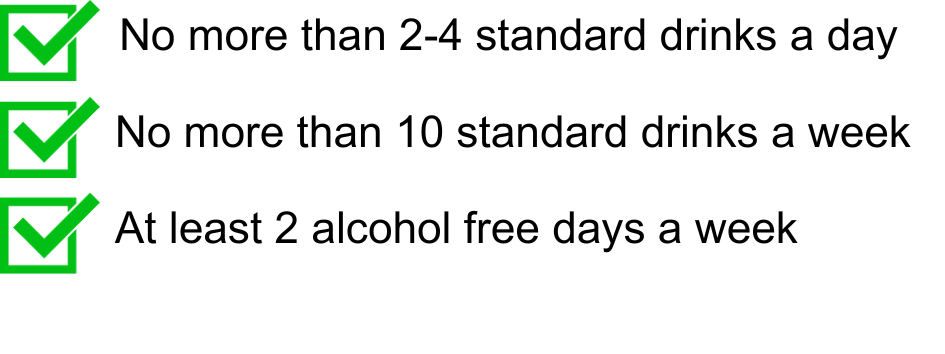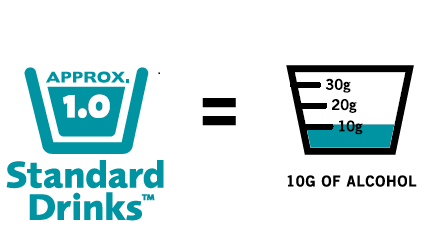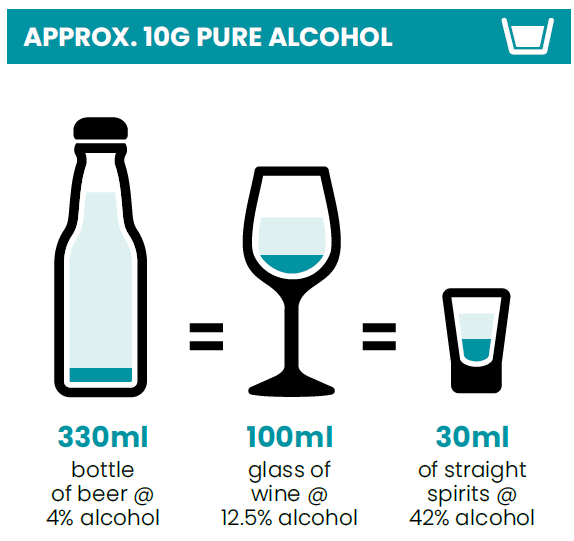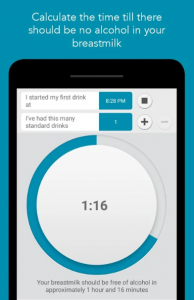Alcohol is a part of our culture in Aotearoa New Zealand. If you choose to consume alcohol, drinking within the recommended limits can reduce your risk of serious health conditions. However, drinking too much alcohol can affect you in many ways – it can negatively impact your physical and mental health, decrease your fertility and if you are menopausal, it can trigger symptoms.
This resource will help you find out how you can still enjoy a drink whilst minimising the impact on your health and whether it’s OK to drink while you are pregnant or breastfeeding/chestfeeding.
How much alcohol can I drink?
The bottom line is that there is no ‘safe’ amount of alcohol to drink. However, by staying within the guidelines you can reduce long-term health risks.
Alcohol.org.nz recommends no more than 10 standard drinks a week for women. This works out to be 2 standard drinks a day, with at least two alcohol-free days each week. If there is a day where you are going to drink more, it’s best to not exceed 4 standard drinks.

To find out how your drinking habits compare with other people in New Zealand, take this quiz to help assess your relationship with alcohol.
What is a standard drink?
A standard drink is an easy way of telling how much alcohol is in your drink. One standard drink contains 10 grams of pure alcohol. All alcoholic drinks in Aotearoa New Zealand must be labelled with the number of standard drinks they contain.
An example of one standard drink is a small glass of wine (100ml), 330ml (1 can) of beer or 30ml (a double shot or 2 nips) of spirits like vodka, gin, or whisky. Check out this standard drink calculator and try your hand at pouring a standard drink.


Effects of alcohol of health
Drinking too much alcohol over the long-term can impact your health in a number of ways. Reducing the amount of alcohol that you consume, or not drinking alcohol at all can:
- Help to improve physical and mental health1
- Reduce the risk of stroke and some cancers (such as breast, bowel and liver cancer)1
- Help to reduce the frequency and severity of alcohol-associated violence and risk of sexual assault2
- Improve fertility. Drinking alcohol can decrease fertility. The more alcohol consumed, the more of an impact alcohol has on fertility3. Long-term heavy drinking can lead to the loss of arousal and sex drive1
- Reduce menopause symptoms. Alcohol can be a trigger for menopause symptoms and can interrupt sleep – which also impacts symptoms4,5
If you or someone you know needs help with alcohol, you can get in touch with the Alcohol Drug Helpline for support.
Can I drink alcohol while pregnant?
No – all types of alcohol are harmful, at all stages of pregnancy. You should avoid drinking alcohol if you are pregnant or there is a chance that you could be pregnant.
That’s because alcohol is absorbed into the blood stream, where it is carried to the placenta and directly to your baby. Drinking alcohol in pregnancy may affect the development of your baby’s organs, such as the brain. Drinking alcohol may also increase your risk of miscarriage, still birth, preterm birth and development disabilities such as Fetal Alcohol Spectrum Disorder (FASD).1
Can I drink alcohol while breastfeeding or chestfeeding?
Yes, though with some important considerations. If you want to, you can enjoy a glass of wine or beer – in moderation. For most people, this is about 1-2 standard drinks. As a general rule, if you are safe to drive, then you are safe to breastfeed your baby6.
Alcohol will be present in your breastmilk after drinking – the alcohol in your breastmilk is the same level as the alcohol in your bloodstream. So, as alcohol leaves your bloodstream, it leaves your breastmilk too.
Breastfeeding women/people who are chestfeeding need to be mindful of their alcohol consumption, as drinking too much alcohol can affect your ability to care for your baby. To keep you and your baby safe, follow these recommendations: 6,7,8
- Avoid alcohol in the first four weeks after birth – too much alcohol can affect your milk supply and your baby’s sleep
- It’s best to avoid breastfeeding/chestfeeding for around 1-2 hours after each standard drink – this will give your body time to clear the alcohol from your breastmilk
- If you are planning on consuming alcohol, the best time is straight after you have breastfed your child
- You may wish to express breastmilk before drinking and offer your baby expressed milk while you wait for your milk to sober up
- There is no need to ‘pump and dump’ to remove alcohol (it isn’t trapped in your milk), unless for comfort if your breasts are feeling full
- If you have consumed any alcohol, do not bedshare with your baby
- If you intend on drinking a large amount of alcohol, ensure that there is a sober adult to care for your baby
The Feed Safe NZ app can help you to make safer decisions while drinking and breastfeeding or chestfeeding. The Australian Breastfeeding Association has also written a useful guide, if you would like more information.

Tips for reducing alcohol intake
In recent years, we’ve seen a shift in more people choosing to drink less alcohol or not drink at all. This can be for a number of reasons, such as improved mental health, avoiding the dreaded hangover, or saving some money.
If you would like to reduce your alcohol intake, try these tips for cutting back:
- Choose a low- or non-alcoholic beverage – there are some great alcohol-free beer, wine and spirit options which allow you to still enjoy a drink
- Space – have a break between drinks. Grab a sparkling water or fizzy drink, play a game of pool, or have a dance without a drink in your hand
- Have a break – choose at least two days a week not to drink alcohol
- Choose a smaller size – have a smaller glass of wine, or bottled beer instead of a pint
- Eat while you drink – having food with alcohol slows down the absorption of alcohol
Useful links
Alcohol Healthwatch » New Zealand health promotion agency focused on harm reduction for alcohol.
Alcohol.org.nz » provides information, advice, research and resources aimed at breaking the cycle of alcohol harm in Aotearoa, including a guide to standard drinks and “is your drinking ok” quiz.
Women and Alcohol in Aotearoa/New Zealand » study conducted by Women’s Health Action in collaboration with Alcohol Healthwatch, investigating young women’s alcohol consumption.
Feed Safe NZ » app to help you manage alcohol while breastfeeding/chestfeeding.
Alcohol and Breastfeeding » a guide providing information on breastfeeding/chestfeeding and consuming alcohol.
Advertising Standards Authority » for information on the Alcohol Advertising And Promotion Code and how to make a complaint.
References
1Alcohol New Zealand. Wellbeing and Alcohol, accessed 21 Dec 2023. Available from: https://www.alcohol.org.nz/wellbeing/
2Women’s Health Action. Women and Alcohol in Aotearoa/New Zealand – Policy Briefing Paper. 2013. Available from: https://www.womens-health.org.nz/wp-content/uploads/2014/08/WomenAndAlcoholBriefingPolicy_web.pdf
3Drinkaware UK. Alcohol and Fertility, accessed 21 Dec 2023. Available from: https://www.drinkaware.co.uk/facts/health-effects-of-alcohol/pregnancy-and-fertility/is-alcohol-harming-your-fertility
4Mayo Clinic. Menopause, accessed 21 Dec 2023. Available from: https://www.mayoclinic.org/diseases-conditions/menopause/diagnosis-treatment/drc-20353401
5New Zealand Early Menopause. Symptom Relief, accessed 21 Dec 2023. Available from: https://www.earlymenopause.org.nz/symptom-relief
6Johnston, H (2019). Letter to the Coroner. Available from: https://www.documentcloud.org/documents/6269193-Letter-to-the-Coroner
7Australian Breastfeeding Association. Alcohol and Breastfeeding, accessed 21 Dec 2023. Available from: https://www.breastfeeding.asn.au/resources/alcohol-and-breastfeeding
8La Leche League International. Drinking Alcohol and Breastfeeding, accessed 21 Dec 2023. Available from: https://llli.org/breastfeeding-info/alcohol/